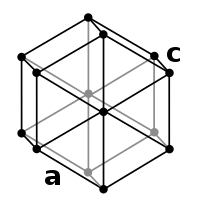
Photo from wikipedia
Abstract The Rh nanoparticles supported on silica were prepared by hydrazine reduction in aqueous medium. The obtained catalysts are characterized by X-ray diffraction, transmission electronic microscopy, and energy dispersive X-ray… Click to show full abstract
Abstract The Rh nanoparticles supported on silica were prepared by hydrazine reduction in aqueous medium. The obtained catalysts are characterized by X-ray diffraction, transmission electronic microscopy, and energy dispersive X-ray analysis. Their catalytic performances were evaluated in the hydrogenation of styrene. The results show that the catalytic activity has been greatly affected by the temperature, silica support and the method of preparation. The activity of supported catalyst is about 12 times that of the unsupported systems. Moreover, the catalytic activity of the supported catalysts increases when the Rh loading decreases. This is ascribed to the degree of the metal dispersion, which increases with a decrease in the Rh loading in the catalysts. The results reveal also that the catalyst prepared by programmed temperature reduction seems to be more catalytically active than the catalyst prepared by the isothermal reduction procedure.
Journal Title: Kinetics and Catalysis
Year Published: 2020
Link to full text (if available)
Share on Social Media: Sign Up to like & get
recommendations!